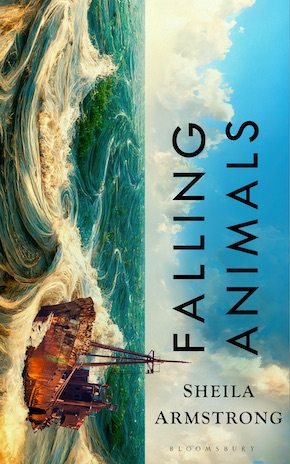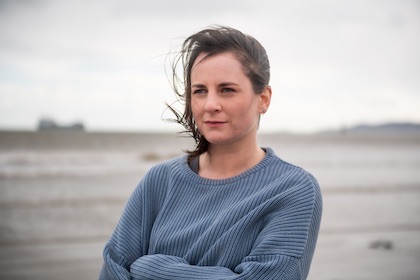Weaving fiction from the real and imagined
by Sheila Armstrong
Nearly fifteen years ago, a man was found dead on a beach in the northwest of Ireland. Nobody knew who he was or where he had come from. The man had taken steps to hide his identity by using a fake name, paying in cash, and disposing of his belongings as he travelled. That scene was the seed for my novel, Falling Animals – a nameless corpse, alone on a beach.
The case was fascinating. Others had thought so too – there were documentaries and podcasts and endless Reddit threads theorising about the man’s bizarre behaviour and identity. People assigned meaning to the false name he gave at a hotel, the purple bags that held his belongings, his every movement on the last days of his life. Every possible history was imagined for him, but still there was no obvious answer. To this day, he hasn’t been identified.
This happened in my hometown of Sligo, so I was familiar with the case from the beginning. I was drawn to the story because of its strangeness, but I knew all along that I wasn’t going to write about the dead man himself. That wasn’t a story I was comfortable telling. Another writer might have felt differently, but for me it felt disrespectful in a way I’m still not sure I understand.
What I was more interested in was imagining the reactions of those around him, using the dead man as a cypher for something bigger and more universal. The novel is written from eighteen points of view, and it follows many different lives as they cross paths. We all have thousands of tiny interactions each day, and we have no idea which are significant until much later. I stop to tie my shoe, hold up a passer-by, they miss their train and lose their job – you can imagine any amount of cascading consequences. In this book, there’s a similar chain of effects – a man dies on a beach, then, chapters later, characters grapple with their own experiences of grief, guilt and loss.
Writers are like parasites – we survive on other lives, other histories, other stories. Because there’s no such thing as a divine bolt of inspiration coming down from the heavens. Everything we write has its origin somewhere. Sometimes it’s a character or plot we’ve come across, a situation or a setting. Other times it’s more abstract, like an emotion. In this book, I’ve written about characters from all over the world, with different backgrounds and different challenges. But there’s always a kernel of experience there, something I’ve pulled from my own life – homesickness, depression, loneliness, frustration.
While real life can offer up seeds of inspiration, I find there’s great freedom in fiction. If you need something for your plot to work – a street to be one-way, a character to have a certain characteristic, the rules to be subtly different in the universe you are creating – you have full control. I don’t worry too much about having an encyclopedic knowledge of the topic I’m writing about. The case of the dead man on the beach wasn’t the only true story I pulled from, and each time I twisted details to make them fit with the story I wanted to tell. Fiction means you’re not tied to the truth.
The reality is that the man that inspired this story went to huge lengths to die quietly, on his own terms. I have stirred it up again, added details and motivations that never existed. I would be furious in his place.”
Because writing straight from real life can be tricky and can sometimes get you in trouble. Every writer I’ve met has had someone say: “that character is based on me” or “you based that on this experience”. There’s rarely a direct throughline from reality to what ends up on the page, but still every reader will see something different in what’s on the page. That’s the beauty of it, I suppose, that people will do the work for you by assigning meaning that you didn’t intend.
But when you fictionalise something there’s a danger in forgetting that there was a real person there in the first place. I still feel slightly uncomfortable with what I have done in this book. The reality is that the man that inspired this story went to huge lengths to die quietly, on his own terms. I have taken that and stirred it up again, added details and motivations that never existed in the first place. I would be furious in his place.
As a writer, it’s easy to take and take and decide that we have carte blanche to use what we want and discard the rest. But I think we have a duty to think carefully about what we’re putting on the page, especially if it is someone from a different background or with different life experience. But at the end of the day, I may only be trying to convince myself – I’m not sure if there is any ethical way to write about real life. I think that all you can do is treat your source material with respect and gratitude, using it as a leg-up rather than a piggyback.
—

Sheila Armstrong is a writer from the northwest of Ireland. She spent ten years in publishing and now works as a freelance editor. Her first collection of short stories, How To Gut A Fish was longlisted for the Edge Hill Prize in 2022, and her writing has been listed for the Society of Authors Awards, the Irish Book Awards, the Galley Beggar Press Prize and the Kate O’Brien Award. She is an Arts Council Next Generation Artist. Falling Animals, her debut novel, is published by Bloomsbury in hardback and eBook.
Read more
armstrongsheila.com
@sheela_no_gig
@BloomsburyBooks
Author photo by Ruth Medjber

